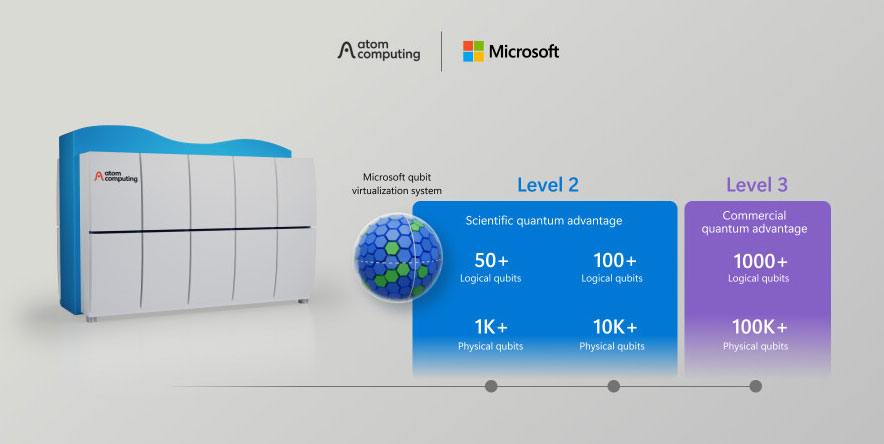Microsoft is about to build the world's most powerful quantum computer
In June 2024, the Redmond company announced a roadmap to build what could be the world's most powerful quantum computer. Today, at Quantum World Congress, Microsoft continued to make notable announcements about its direction in quantum computing, including a new partnership that Microsoft says will create the most powerful quantum machine in history.
In an official blog post, Microsoft said it is collaborating with Atom Computer to develop the machine. The main goal of the agreement is to combine Microsoft's advanced qubit visualization system with Atom Computer's neutral quantum hardware. Microsoft said it has created logical qubits through collaboration with Atom Computer, and the two companies are working to ensure that the future quantum machine can deliver reliable quantum computing features and results.
Atom Computing's hardware uniquely combines the capabilities needed to scale quantum error correction, including large numbers of high-fidelity qubits, synchronized qubit interconnects, long coherence times, circuit-to-circuit measurements, and qubit reset and reuse. The company is building second-generation systems with more than 1,200 physical qubits and plans to increase the number of physical qubits tenfold with each new generation of hardware.
Additionally, Atom Computing will use Microsoft's fault-tolerant protocols. The partnership is also designed to demonstrate that Microsoft's Azure Quantum platform can reliably deliver logical qubits with a variety of hardware solutions. There is no word yet on when Atom Computing machines using Microsoft's platform will be available for commercial use.

Back in April, Microsoft announced a quantum computing collaboration with another hardware partner, Quantinuum. The two companies were able to create reliable logical qubits with an error rate 800 times lower than using physical qubits. Today, Microsoft said it has teamed up with Quantinuum again to create 12 highly reliable logical qubits. This is 'the largest number of entangled logical qubits, with the highest fidelity, ever recorded.'
Essentially, quantum computers possess special properties that allow them to process exponentially more information than conventional, also known as 'classical' computers. With a classical computer, data is represented as a binary string of 1s and 0s. However, quantum computers can represent data as 0s, 1s, or both at the same time, for complex mathematical reasons — meaning they can process much more data at once.
It can be seen that quantum computing will be a particularly useful method, which can be applied in fields that require large computational needs such as predicting the stock market, finding more efficient shipping routes, food production, chemistry, pharmaceutical research, cryptography and many other important fields. "Quantum computing is an opportunity to simplify the processing of some 'classic' problems that humanity is facing such as health care or climate change, and at the same time can solve them within just a few hours or seconds through quantum computing systems."
You should read it
- Join Microsoft's free Quantum computing course today
- What is quantum computing and how did people develop this technology?
- New chip technology can enhance quantum computing
- Even Bill Gates doesn't understand the algorithm behind quantum computing
- Quantum computing will become Amazon's key business service
- Google achieves new achievements in quantum computing with the 53-qubit Sycamore chip
 AI predicts storms 10 days in advance, with outstanding results
AI predicts storms 10 days in advance, with outstanding results Close-up of bullet shattering when fired at 'fragile' pendulum system
Close-up of bullet shattering when fired at 'fragile' pendulum system Astronaut captures footage of meteorite exploding in Earth's atmosphere
Astronaut captures footage of meteorite exploding in Earth's atmosphere 6 benefits of playing games on laptop
6 benefits of playing games on laptop Instructions for creating playlists in TikTok
Instructions for creating playlists in TikTok 7 Things Windows PCs Can Do That Macs Can't
7 Things Windows PCs Can Do That Macs Can't